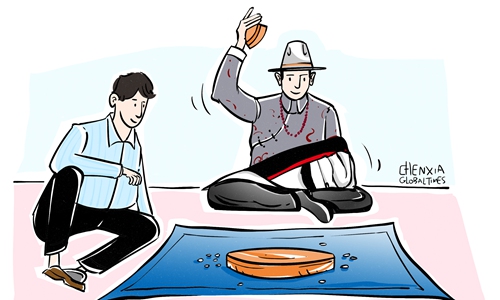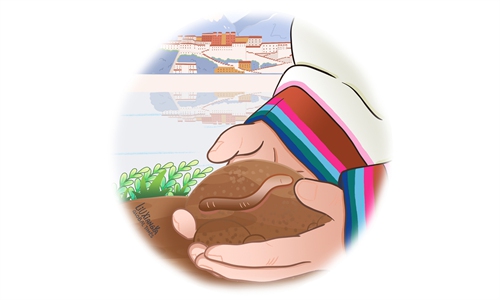ARTS / ART
Tibetan dice games bridge past, present

Illustration: Chen Xia/Global Times
When conducting interviews in Xizang, I always seek out my exceptionally skilled Tibetan partner Dawa. In addition to our daily collaboration, he can ensure my safe return each time from these regions with an average altitude of over 4,000 meters. He can embellish the desolate journey with legendary stories not found in any books or share complaints about his mischievous son's various "exploits" at school with me. Most importantly, he will always have something fun on hand.
That year, we were in a small town in Nagqu Prefecture. The town experienced a power outage. Dawa and I hastily had a dinner in a small tea house in the town. I was prepared for a long and cold night ahead. However, at that moment, Dawa took out a beautifully crafted cloth bag from his pocket and systematically retrieved some peculiar and beautiful trinkets. There was a wooden bowl, a round leather cushion with a diameter of about 20 centimeters, and a pile of small white seashells. The protagonists, though, were two dice made of ox bones.
I still remember that delightful and enjoyable night to this day.
Throughout history, dice games have been prevalent worldwide. However, the Tibetan people have taken the playful aspect of dice to the extreme while minimizing its gambling nature. Few things bring as much entertainment as the combination of "randomness" and control over the element of "chance." Tibetan dice games epitomize this sense of amusement. I quoted Albert Einstein's famous saying, "God does not play dice with the universe." However, Master Dawa remarked that maybe it's because he hasn't been to Xizang.
Throwing dice is a widely popular folk game in Xizang. In ancient Tibetan culture, dice throwing was not initially entertainment but rather a significant form of divination and fortune-telling, especially during the Tubo Kingdom (about 618-842) when dice casting for divination was prevalent. Over time, dice throwing gradually evolved into a form of entertainment, moving from the realm of religious altars to the common people, becoming one of the essential "arts" for men. Due to the suitability of dice games for the Tibetan ethnic group's living environment, geographical conditions and customs, it gained widespread popularity, emitting its unique charm to every corner of Xizang.
At that night, people in the tea house gathered around. Some of them had never met before, while some others, despite being neighbors, had some conflicts. However, when the game began, the underlying dynamics of this world changed. During the competition, they could clash, interfere with each other, return to the starting point, or take a break for a round. While playing, everyone returned to their childhood, shouting and cheering passionately, fully immersed in the game's lively atmosphere. The most unforgettable part was when they threw the dice, chanting dice incantations that echoed like spells in the night sky of that border town.
These chants had been passed down from the distant mythological ages.
Dice incantations are definitely the soul of dice games. Due to variations in living environment, the dice incantations in different regions across Xizang have their own characteristics, generally divided into two major branches: pastoral incantations and agricultural incantations.
Firstly, it's essential to understand that the numbers that can be rolled with two dice range from two to 12. Each number is crucial to the success or failure of the game. The actual value of the rolled number is not as important as whether it can be used to combine with or add to one's own chips, or if it can be used to capture the opponent's chips. Therefore, people affectionately nickname the numbers they desire, often based on homophones or meaningful associations. Most of these Tibetan homophones are derived from ancient texts, showcasing distinctive ethnic characteristics and personalities. Before players roll the dice, they use designated codes for the desired numbers, reciting concise and straightforward incantations in the Tibetan language.
For instance, when you need to roll a two and three, you would say, "If I climb the wish-fulfilling tree, even if my satin robe and leather jacket are torn, so be it." In Tibetan Buddhism, the wish-fulfilling tree is a magical tree with spiritual powers. Therefore, these incantations not only reflect people's desire to seek the true essence of Buddhism but also showcase the characteristic of using Buddhism to fulfill their daily spiritual needs.
In Tibetan folklore, many stories about dice games have been passed down. For instance, tales from ancient times recount how various gods and immortals determined their respective domains by throwing dice. There are also stories of using dice to decide the fates and experiences of the common people within their jurisdictions. In the world's longest epic, King Gesar, dice games play a significant role. Gesar is known as the third son of celestial beings in Tibetan folklore. In a series of competitions, including dice games, he lost to his two elder brothers. Consequently, he took on the responsibility of being reborn on Earth, subduing demons, and saving humanity. This epic masterpiece also portrays the deity of the year as riding a yellow horse, wearing yellow armor, having a yellow body, and enjoying dice games, earning him the title "God of Games."
You can see that games are the lively and dynamic component in the bloodstream of a culture.
What games present is no longer static text but rather the fundamental concepts and attitudes toward life, the world, and the entire universe for each community. These concepts are passed down from generation to generation through successive adjustments of rules, the addition of chants, and repeated random actions, fully preserved from history. In today's Xizang, numerous traditional games, much like throwing dice, bring people back into the joy of millennia ago, away from the digital existence.
When the game begins, they get to revel with all their ancestors.
The author is a lecturer at Hunan University, and holds a PhD from Renmin University of China. life@globaltimes.com.cn




